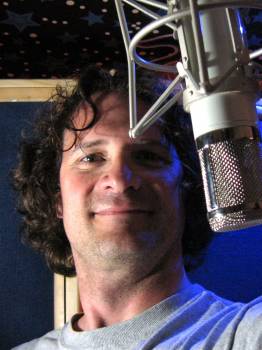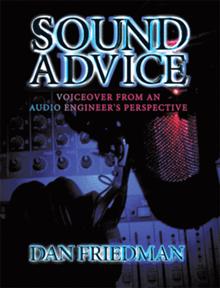|
DIRECTING When You Are The Director, Know How To Get The Best From Talent  By Dan Friedman By Dan Friedman
Producer, Audio Engineer & Voice Talent Effectively communicating with a voice over talent during a recording session can be a struggle for clients - and for many new directors. Recently, a client suggested posting
"a list of words that can be used to help explain the changes they would like the voice over person to modify." This sounds like a great idea and an easy thing to do. Right? Well, yes - and no. While a list may be helpful in some situations, it would
only scratch the surface of what may be involved when directing a voice talent. LANGUAGE CONTRADICTIONS Much of the language used when
directing seems contradictory. For example, "urgency" almost never means to read the script fast, and "intensity" does not mean to shout or automatically give a script the monster truck rally treatment: "SUNDAY! SUNDAY! SUNDAY! YOU'LL PAY FOR THE WHOLE SEAT. BUT YOU'LL ONLY USE THE EDGE!" While
that delivery is intense, it
would be inappropriate on an intense commercial for a hospital.
Similarly, while "urgent care" in a hospital means to get care quickly,
in a commercial for a hospital, "urgent" usually means to read somewhat
slowly with great concern and importance. IS THAT COOL? Another term that is used frequently is
"cool." Does this mean cool as in hip, or cool as in calm?
Contradictory and/or ambiguous language is just one reason why a list of
words or certain terminology will not help in every circumstance.
Every talent responds differently to different methods of direction. So, what works for one talent may not work for another. HELPFUL CLUES ... OR MORE While some talent may respond well to
simple words or verbal cues, others may need background information such
as what the writer's intention is, or in what format will the final
production be presented (radio/TV commercial, boardroom presentation,
classroom presentation, etc.). Many voice talent like to know the
environment in which a scene takes place - for example, a coffee shop,
city street corner, or bedroom. The same dialog can take place in any of
these locations, but each may require a different delivery. A voice over
talent may want to hear the music if it has been chosen, or be given
specific guidance on inflections, or even where to stop and take a
breath. The possibilities and combinations of factors are seemingly endless. TOOLS AND TEAM Directing, like most things, is much
easier after gaining experience. But the best way to do any job is by
not having to work hard at it. Thankfully, there are a few ways to help
you get the delivery you desire with minimal effort and without needing to do much directing. Like many other professions, using the right tools and having the right team can make the difference. NEED GOOD SCRIPT The first best method for getting the
delivery you want is to have a well-written script. Good scripts
provide road maps for the voice talent. Proper punctuation, grammar and formatting are helpful, but more importantly, the use of descriptive or illustrative words allow the talent to capture the mood and feel of the message. Unless you are seeking a delivery
that is intentionally
counter-intuitive or completely unique - a character voice, for example -
the tone of the script should be obvious to the voice talent. CHOOSE RIGHT TALENT This brings us to the second best method, which is to choose the right talent for the job.
Here is where things can get very tricky. A voice may sound great on a demo, but that doesn't necessarily mean that the voice talent is the right choice for your script. Time and time again, big announcer voices
are hired for their vocal quality, but are asked to sound
conversational. This usually requires additional time and effort for the
delivery to sound believable, as though a "real person" is presenting
the information. KNOW TALENT'S TALENT Some voice talent are more suited to
announcer reads; others are great at sounding conversational, and others
are good at narrating or story telling. Some talent can interpret copy flawlessly, while others need extensive direction, instruction and line reads in order to achieve the delivery you are seeking. Some talent can interpret copy very well while acting as a character, but have great difficulty when delivering the same material as themselves. The trouble
is, as the client acting as director, you often don't know what your
chosen talent's strengths and weaknesses are - until after you've hired
him or her. TAKE FOUR ... With a well-written script, it should
rarely take a voice over talent more than four attempts to get the tone
of the delivery correct. The first take should be left to the talent's interpretation of the script. A good voice talent will usually get reasonably close on the first pass. The second take is used for dialing
up or dialing down the energy or for any clarifications on tone or
characterization. The third take is for fine-tuning any changes made in
take two. By take four, the overall tone will ideally be dialed-in. PRODUCERS AND AUDIO ENGINEERS Great voice over talent don't need much
direction, and a good script will provide most of the information a voice
talent should need. But once the tone and delivery are where they need to be, tweaks and fine-tuning may still be necessary to help the talent provide the best performance possible. This is when experienced audio
producers and engineers become an increasingly more valuable part of
your team. PUSH TALENT'S BUTTONS, TOO Professional audio engineers, who
specialize in voice overs, often take on the role of director. They often work with many voice actors and have experience knowing not only what buttons to push on the equipment, but also which buttons to push within the talent that will produce the desired delivery. They
may also be
responsible for assembling the final mix, and will develop a "vision"
for what will help the final production sound best. When you find an engineer who shares your vision, do not hesitate to allow him or her to interpret your needs and communicate them to the talent if you are having difficulty. --------------------------------------  ABOUT DAN ABOUT DAN Dan Friedman is a voice talent who began as an audio engineer in 1994, working with live sound and also in radio and recording studios. He has been a producer with ProComm Voices for over 11 years, and since 2005, a voice talent with a growing list of clients including several national radio and television campaigns. His comprehensive book, Sound Advice - Voiceover From An Audio Engineer's Perspective, provides an excellent foundation for understanding voice over audio and equipment. Email: danfriedmanvo@hotmail.com
Sound Advice book: Click Here |
|
|
For essential voice-over business strategies
On Michael Langsner's Voice-Over Roadmap Podcast
With Sean Daeley and Paul Stefano - check it out!
Get your bi-weekly dose here ... all things VO!
As of the NEW website launch, 03/22/2012



.gif)






I have a couple of thoughts to add. First, no talent should be expected to do a "perfect take." It's the talent's job to do it brilliantly; it's the engineer's job to clean it up and make it perfect. Second, don't ask for another complete take when a pick-up will do. Directors who stress full take after full take are inviting the talent to imitate themselves.